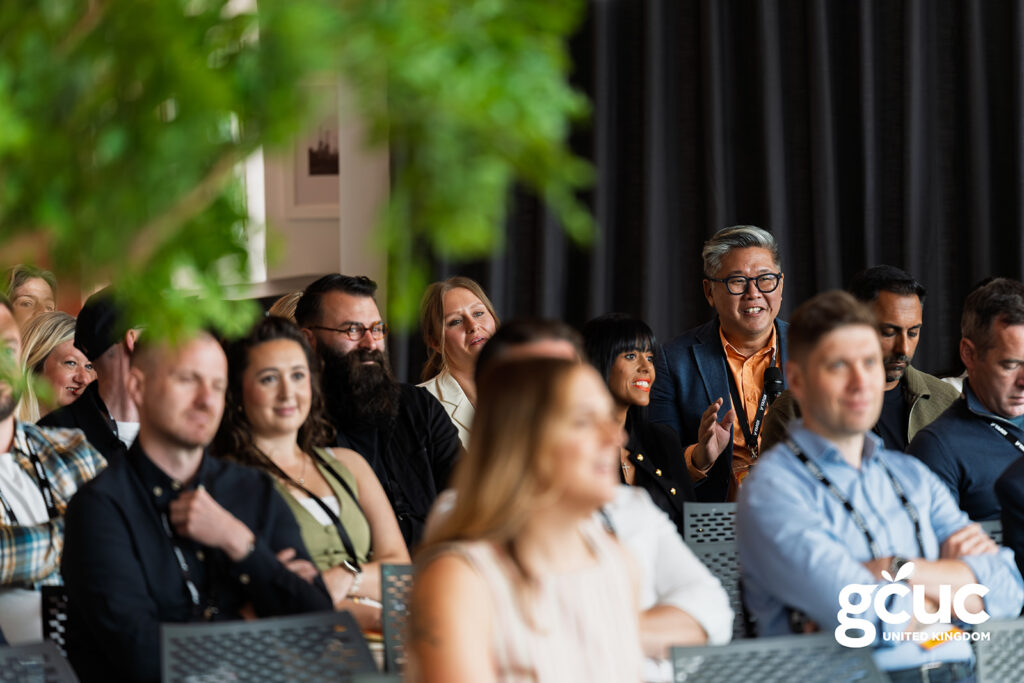From sharp insights to studio tours, a sold out GCUC Manchester brought together 130+ coworking professionals for a day that cut through the noise and tackled the future of flexible workspace head-on.
Set in the Content Studio at MediaCity, with the Manchester skies uncharacteristically blue, operators, landlords and industry insiders came ready to share what’s really happening — the wins, the worries, and what comes next.
Georgia-Kaye Berry (Colony) and Emilie Lashmar (GCUC UK) kicked off the day with infectious energy, setting the stage for what would become a landmark gathering for the UK coworking community.
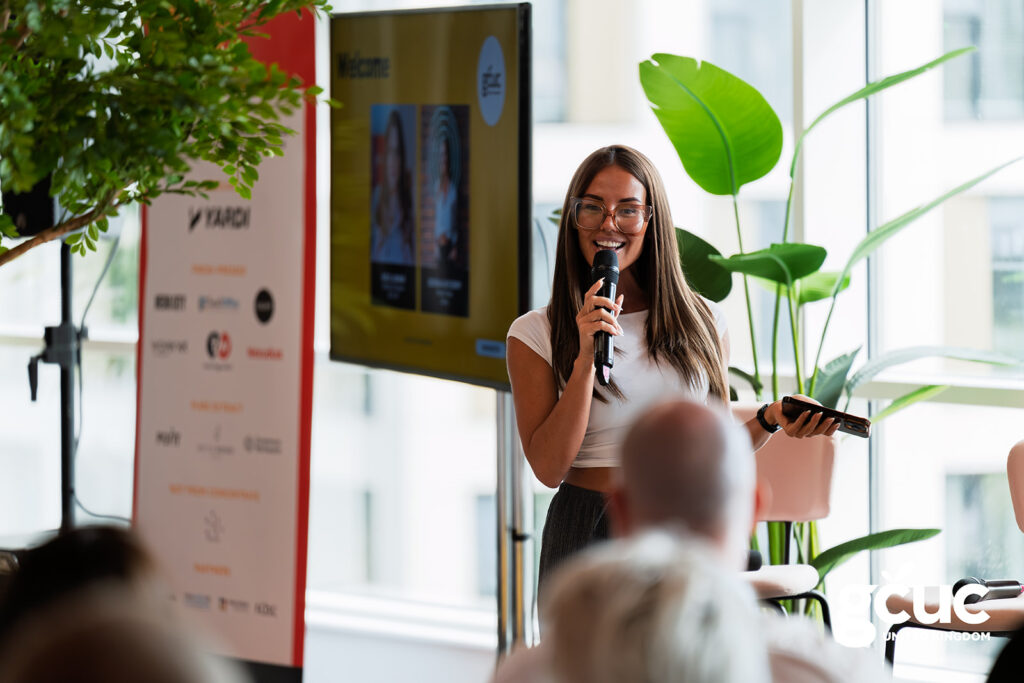
GCUC Manchester host, Georgia-Kaye Berry (Colony)
Here’s what we learned:
The Data Reality Check
Jordan Saleh (CBRE), Ryan Jans (WeWork), and Tanya Grady (Allied London) delivered a no-fluff view of UK flex data — and the gaps still to fix. Key stats from Jordan’s presentation:
- Lease lengths down from 10 to 5.5 years
- 50% of corporates expect 10% of portfolios in flex within two years
- Manchester: 1.4m sq ft of flex space, growing fast
- Professional services now outpacing tech/creative in flex demand
The broader picture shows explosive growth: the UK now has over 4,000 coworking spaces operating throughout the UK and Ireland, placing the region among the world’s most densely supplied coworking markets. 59% of companies plan to expand office space through coworking in the next 2 years, with corporate teams making up 27.6% of the coworking market. Meanwhile, UK landlords anticipate 54% growth in demand for flexible/coworking workspace by 2030, with 10% predicting their portfolio will consist almost entirely (91-100%) of flexible space by then.
However, the industry still can’t agree on what core terms mean. “Occupancy rate” varies operator to operator, leaving clients confused. Standardisation is overdue — especially when nearly half of coworking spaces struggle to turn a profit, with only 20% being profitable.
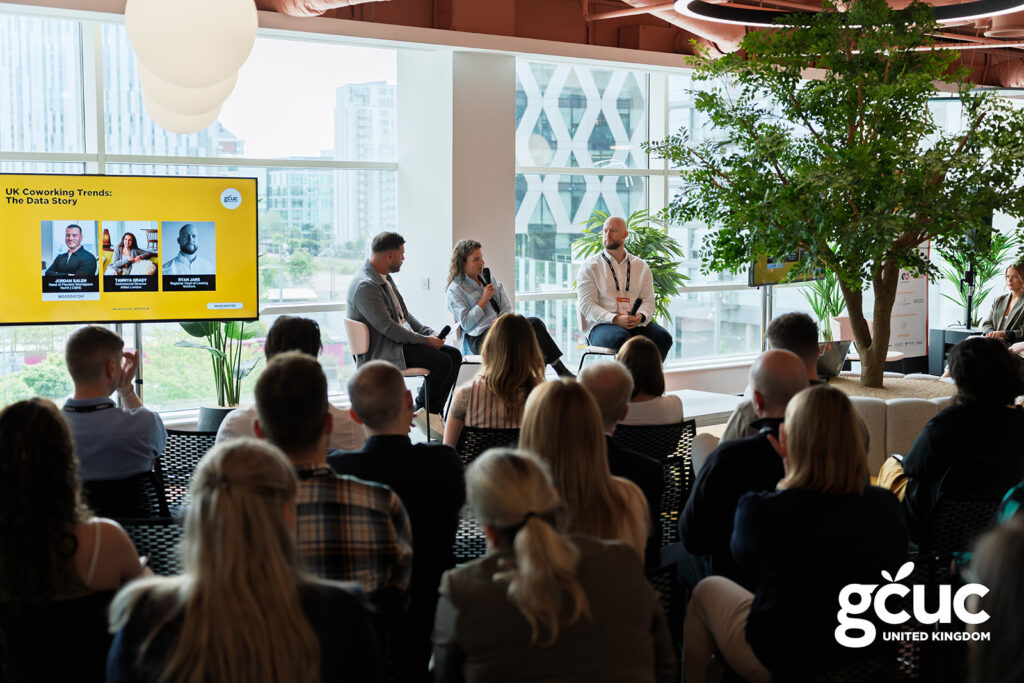
Jordan Saleh (CBRE), Ryan Jans (WeWork), and Tanya Grady (Allied London)
The Gold Standard Experience
What really makes a workspace stand out? Nicola Jones (GPE), Lucy Pickavance (Phoenix Resourcing), Ana Bernardo (Work.Life), and Ben Newton (Patch) drilled into it:
- Ana Bernardo: “It’s the vibe — people enjoying being there.”
- Ben Newton: “Beautiful spaces must work. So many look good but fail operationally.”
- Lucy Pickavance: “Staff experience matters. If staff love it, members will too.”
On recruitment: hire for empathy, curiosity and energy. “You can’t teach someone to care about people.” In-person interviews remain essential.
Regional insights: Patch’s hyper-local approach shows the power of asking communities “what’s missing?” before designing space — leading to podcast studios, wellbeing spaces and real civic relevance.
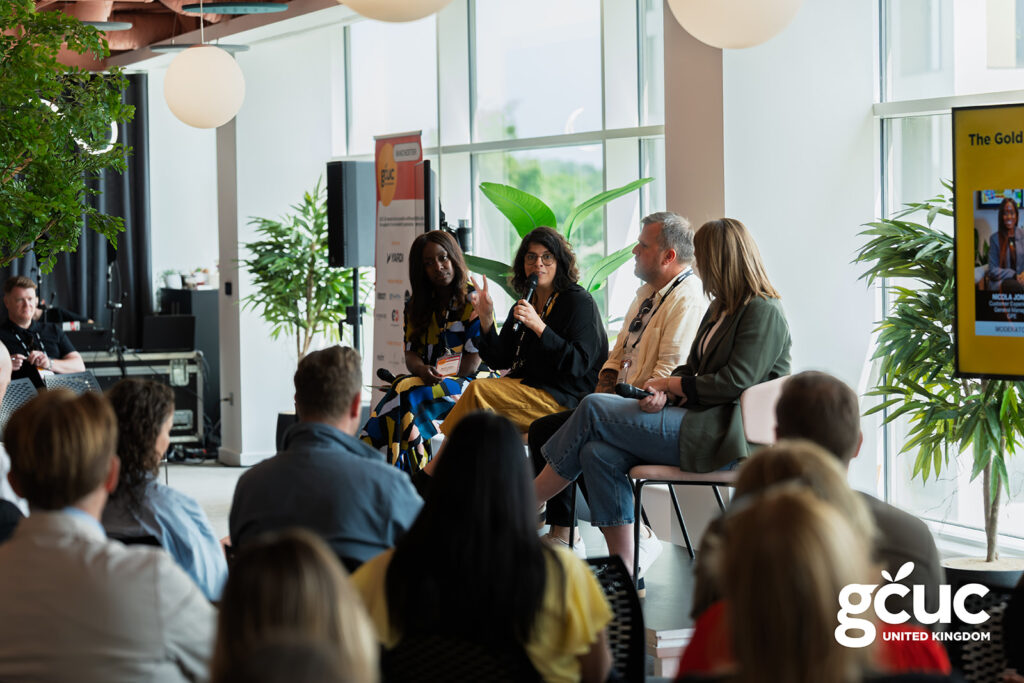
Nicola Jones (GPE), Lucy Pickavance (Phoenix Resourcing), Ana Bernardo (Work.Life), and Ben Newton (Patch)
Big Flex vs. True Grit
When landlords bring deep pockets to flex, can indie operators still win? Lisa Cations (JCR Advisors) moderated a high-energy panel featuring Shannon Burke (managed.), Tom Almas (Wizu), Rebekah Lloyd-Beere (Landsec), and Gareth I. Jones (TownSq). The answers came thick and fast:
Tom Almas: “The market’s tough. Costs are up, desk rates are down. Indies must focus on what landlords can’t match — speed, authenticity, innovation.”
- “Flex is speed. We can move 50 people into space in four days. Conventional landlords take weeks.”
Shannon Burke: “Small operators will always innovate faster — big firms are slowed by red tape.”
Gareth I. Jones: “Community drives loyalty. We talk about ‘boomerang members’ — they leave for cheaper options, but come back when they miss the experience.”
Rebekah Lloyd-Beere: Landlords can compete — but only if they’re truly invested in the people, not just the property.
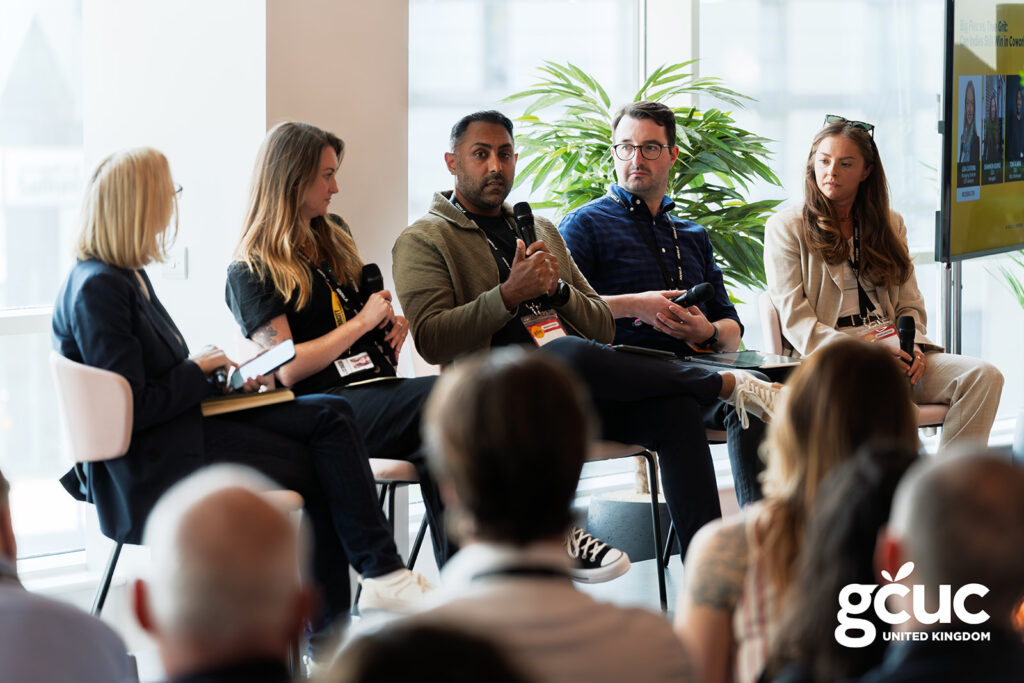
Lisa Cations (JCR Advisors), Shannon Burke (managed.), Tom Almas (Wizu), Rebekah Lloyd-Beere (Landsec), and Gareth I. Jones (TownSq)
Hands-On Learning: Workshop Sessions
The afternoon workshops offered deep dives into practical strategies:
Samuel Warren (technologywithin) led “Low Cost, High Impact: ESG on a Budget,” showing how operators can deliver sustainability wins for under £5k.
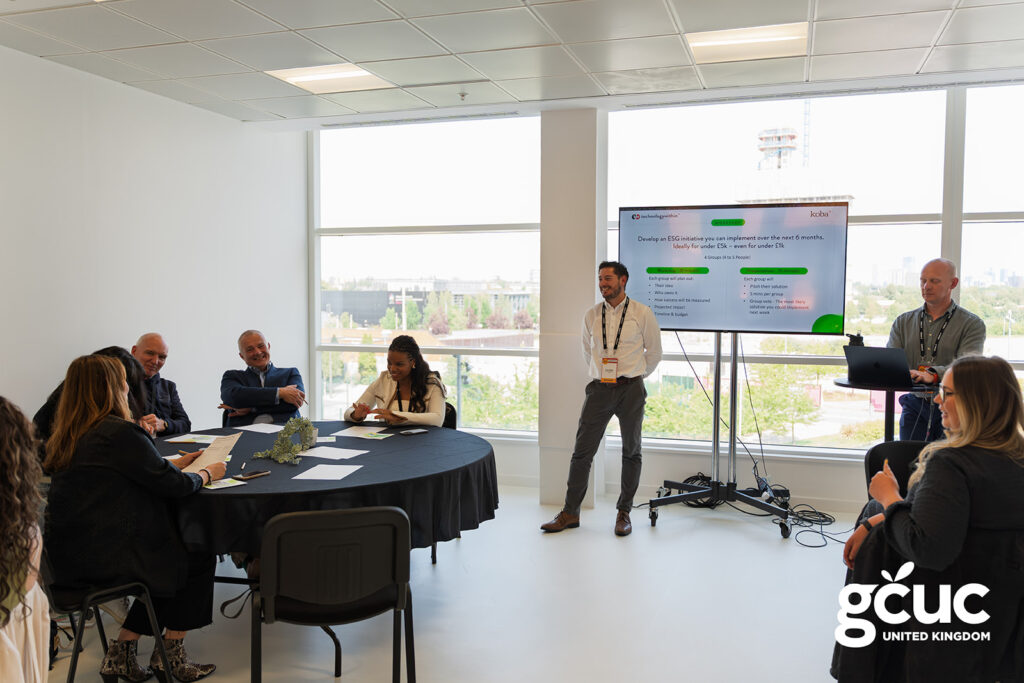
Samuel Warren (technologywithin)
Manuel Conti (PONT) facilitated “AI & Automations,” exploring how artificial intelligence can amplify coworking’s people-first mission while boosting revenue and margins.
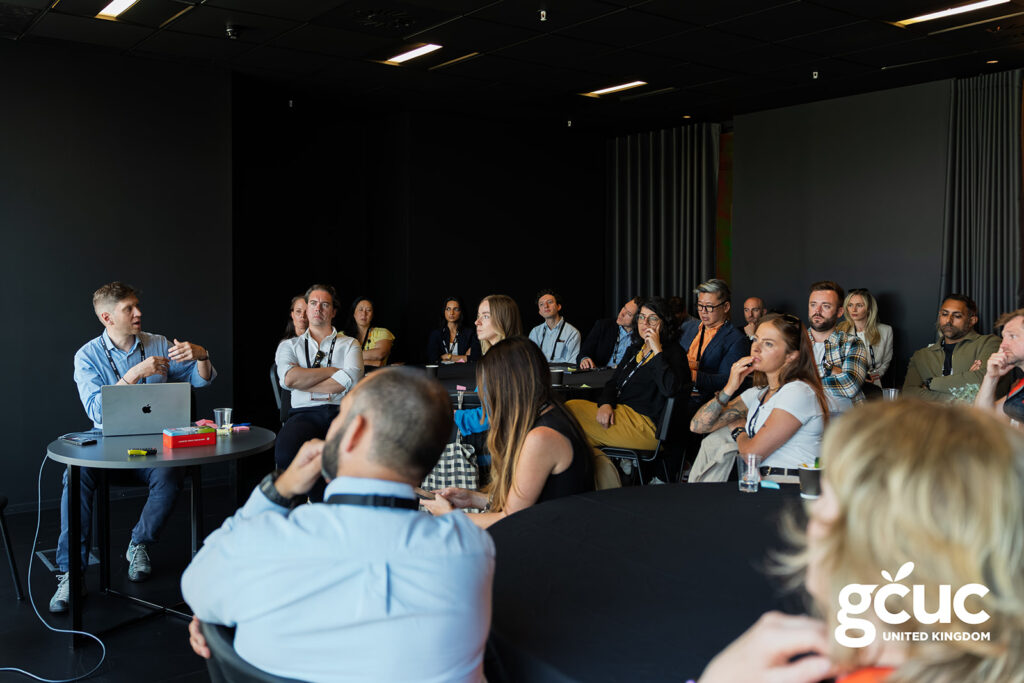
Manuel Conti (PONT)
Claire Carpenter (Claire Carpenter Coaching) guided “Can You Flex Enough,” a dynamic exploration of leadership challenges through ‘serious play.’
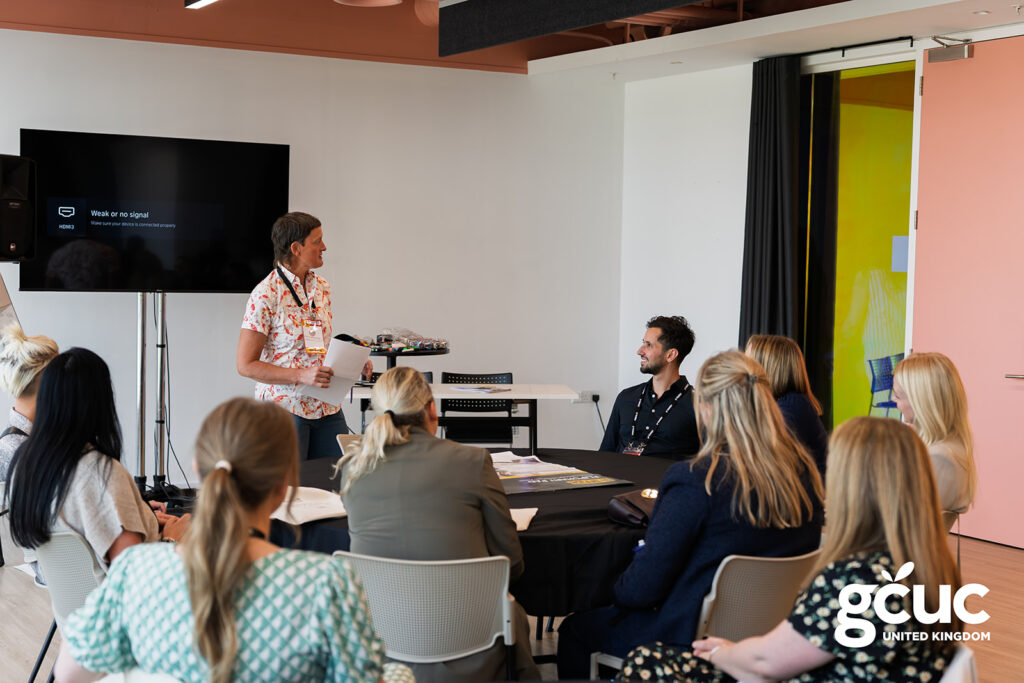
Claire Carpenter (Claire Carpenter Coaching)
George Tilbury (Consensus Workspace) offered an exclusive behind-the-scenes tour of MediaCity, sharing practical strategies for optimising cost and space utilisation.
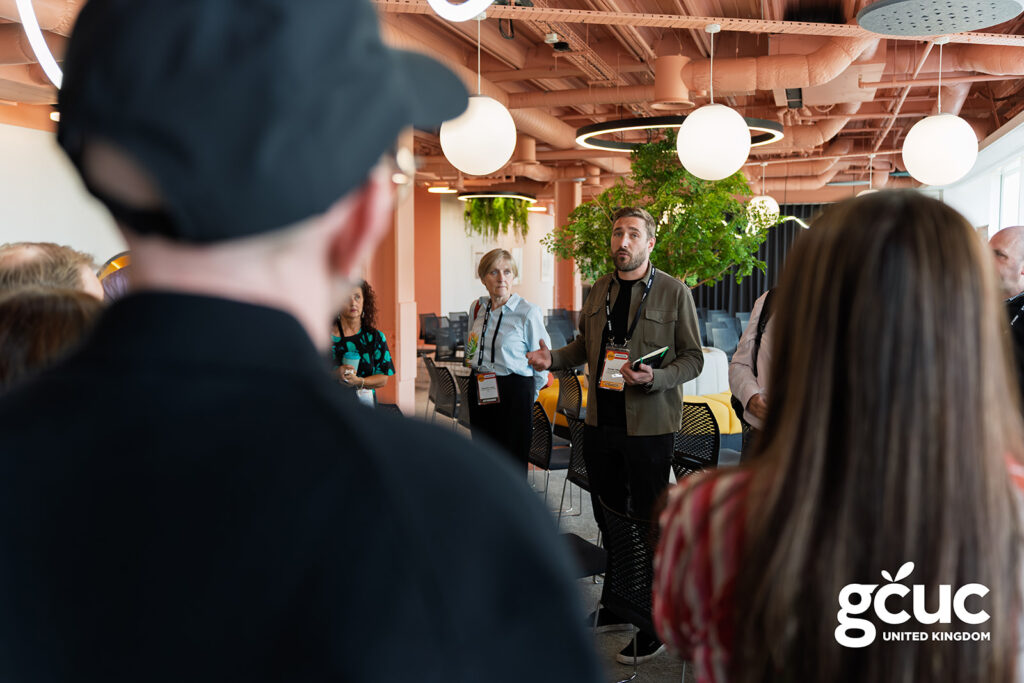
George Tilbury (Consensus Workspace)
Plus, Lisa Quait (Realwoman.coach) ran the Women in Flex Luncheon — a powerful session on crafting authentic presence and reframing imposter syndrome.
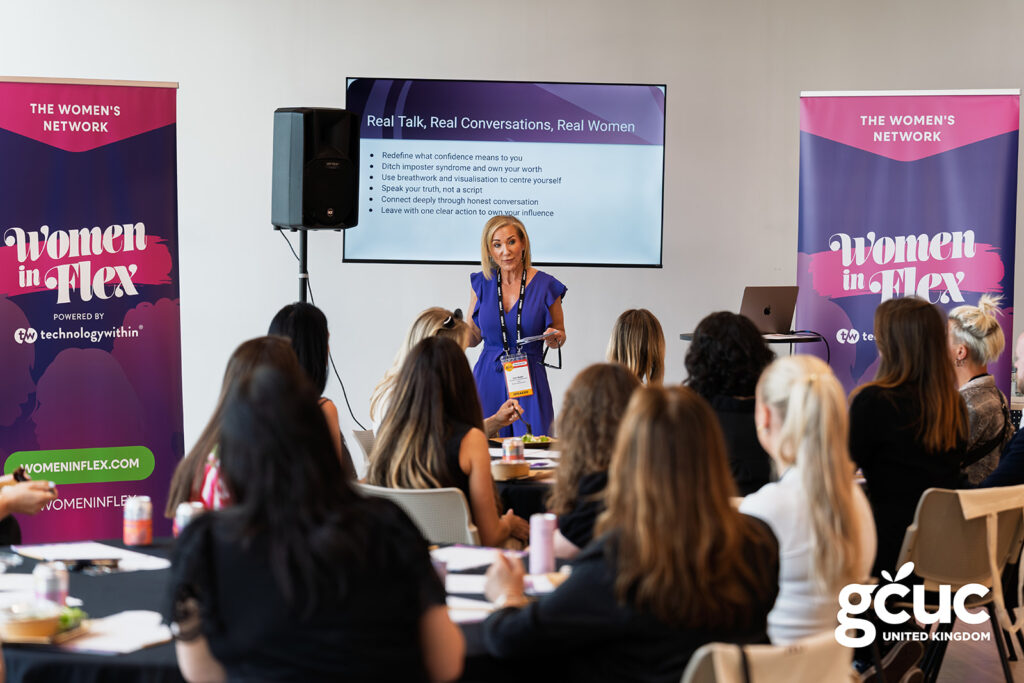
Lisa Quait (Realwoman.coach)
Lessons from Residential: Operational Intelligence
Nicholas Drew (urbanbubble) and Sammy Dukes (Yardi) showed what coworking can learn from residential property:
- 80% of maintenance requests can be automated
- Predictive maintenance reduces emergency repairs by 40%
- Residential models can predict tenant move-outs 60-90 days in advance
The takeaway: coworking’s next frontier is smart, proactive ops — powered by data, but focused on member experience. The stats are staggering: AI-powered pricing tools helped some operators increase revenue by over 50%, while automation tools save coworking teams 15–20 hours per week. AI agents are already doubling knowledge workforces in sales and support roles, with businesses reporting 10-20% productivity increases and 68% higher job satisfaction. The operational intelligence gap is widening fast between early adopters and laggards.
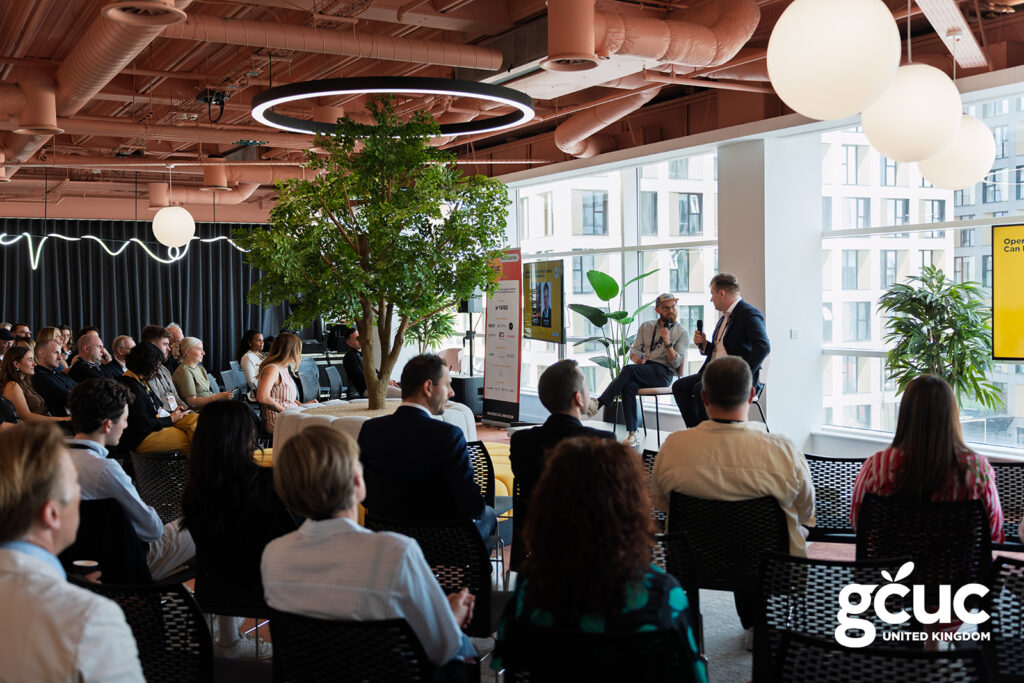
Nicholas Drew (urbanbubble) and Sammy Dukes (Yardi)
Community Is Still Queen
Pauline Roussel (Coworkies) and Jonathan O’Byrne (Collective Works) delivered a sharp fireside chat on true community vs. surface-level buzz:
“Community is who’s in the room. Belonging is how you feel when you walk in.”
A working metric: can your members name 10+ people in the space by first name and role? If not, your community may not be as strong as you think.
And for anyone tempted to chase short-term gains: community loyalty drives long-term revenue. This matters more than ever when median UK coworking prices are hitting £248 for dedicated desks and £175 for open workspace, making price competition fierce. Private offices now take up 80% of space allocation compared to 20% for open spaces, but community-driven loyalty still creates the “boomerang members” who return when they miss the experience.
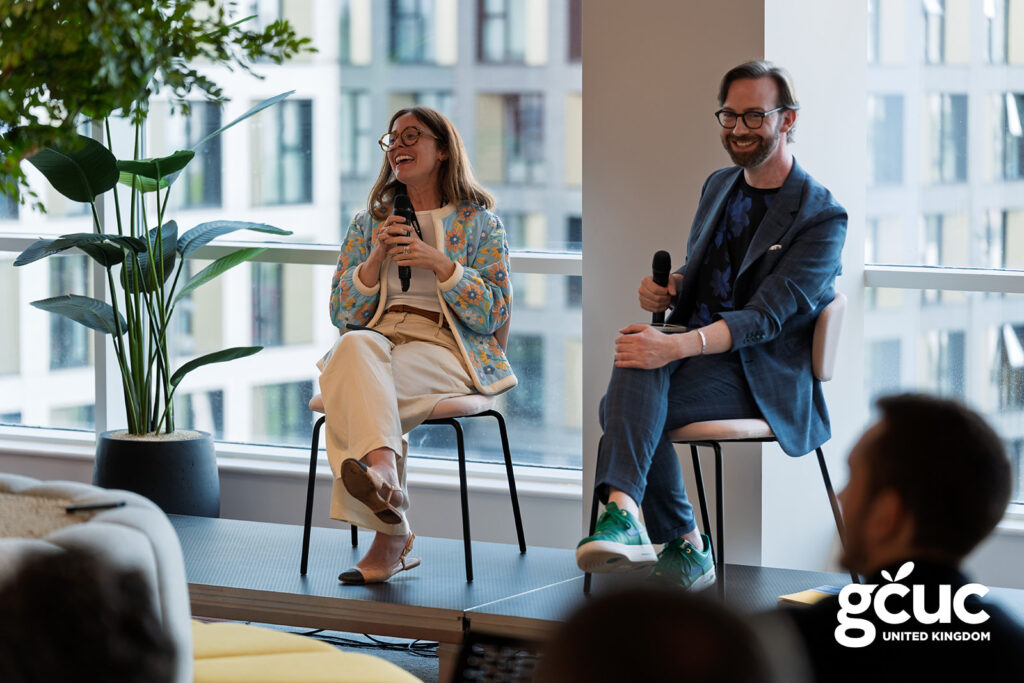
Pauline Roussel (Coworkies) and Jonathan O’Byrne (Collective Works)
The Flex Fiesta & Colony Afterparty
As the formal sessions wrapped, the real magic continued. The Happy Hour at MediaCity’s Content Studio provided the perfect transition from learning to celebration — reception drinks flowing as attendees processed the day’s insights and forged new connections.
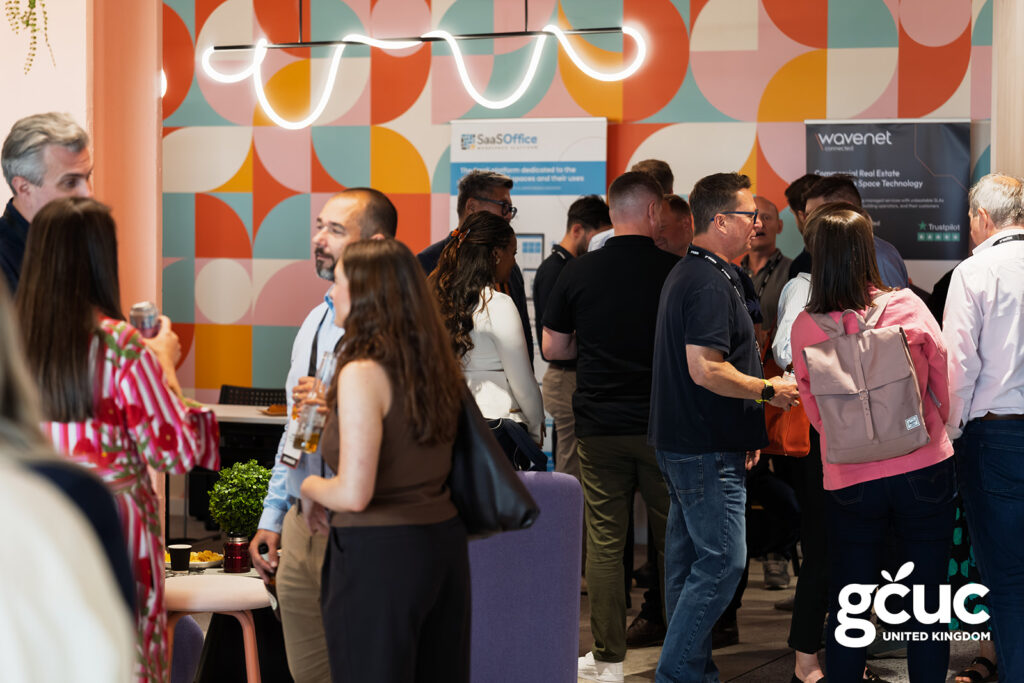
Happy Hour at MediaCity’s Content Studio
But the night was just beginning. The official afterparty at Colony Silk Street transformed Manchester’s skyline into the backdrop for proper coworking camaraderie. With what might just be the best rooftop view in Manchester, Colony’s award-winning venue provided the ideal setting for drinks, music, and the kind of authentic networking that only happens when the lanyards come off and the real conversations begin.
Colony, with their seven standout Manchester venues, proved the perfect host — embodying their ethos that workspaces should be “petri dishes” where ideas, people, and communities grow. The afterparty wasn’t just a celebration; it was a living example of the community-first philosophy that had been championed throughout the day.
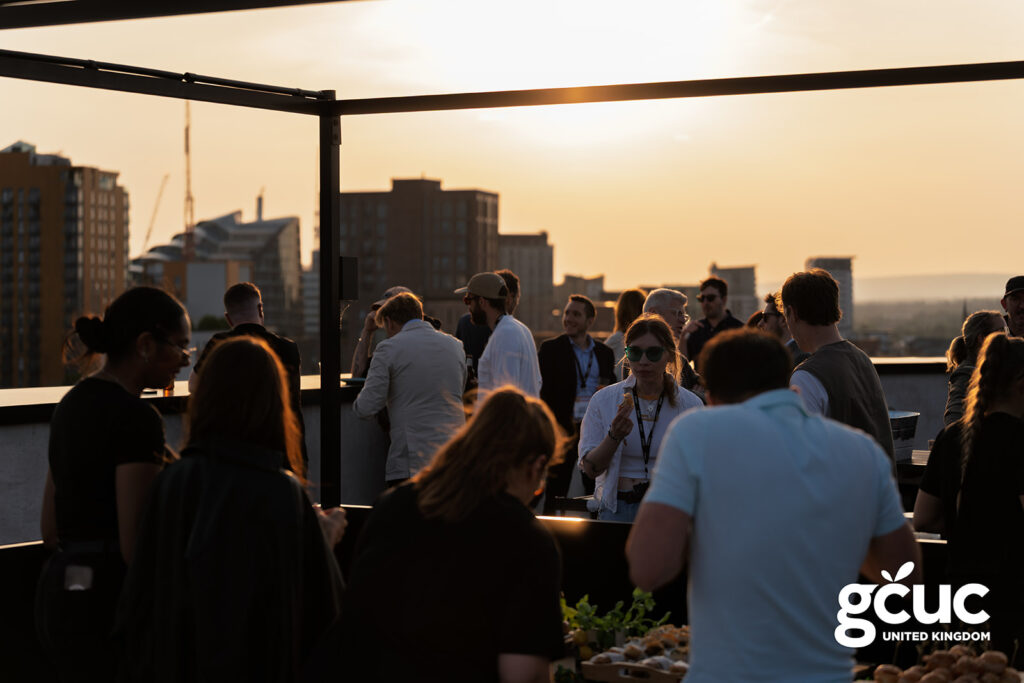
Official afterparty at Colony Silk Street
Coworking Tours
On Day 2, Manchester’s operators opened their doors for site tours — a rare chance to see how different brands approach design, service and market positioning.
Tour 1:
- Work.Life
- Bruntwood SciTech
- Colony
Tour 2:
- Department
- Koba
- Landmark
Seeing coworking “in the wild” reinforced the key theme of the week: success isn’t about the fanciest furniture. It’s about what works for the people in the space.
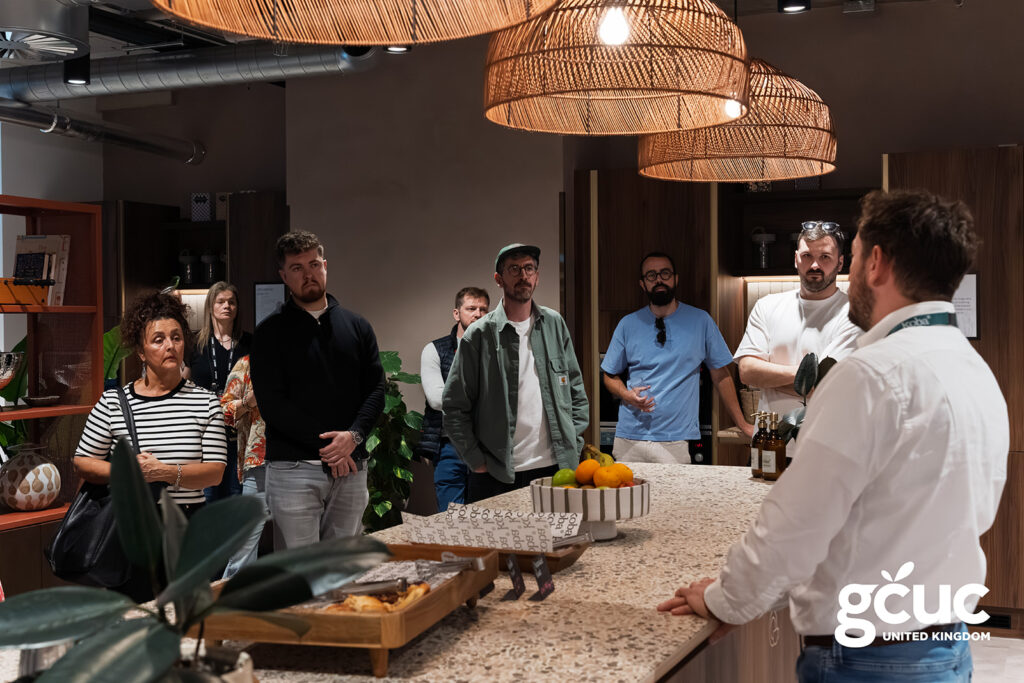
Tour 2: Koba
What’s Next for Coworking?
Five big takeaways backed by the numbers:
1️⃣ Corporate demand is real — and it’s accelerating fast 59% of companies plan to expand office space through coworking in the next 2 years, with corporate teams now making up 27.6% of the market. UK landlords anticipate 54% growth in demand for flexible workspace by 2030, with 10% predicting their portfolios will be almost entirely (91-100%) flexible by then. The corporate shift isn’t coming — it’s here.
2️⃣ Landlords are serious players now — indies must double down on agility The UK now has over 4,000 coworking spaces, making it one of the world’s most densely supplied markets. 59% of landlords say converting office space into flexible workspaces is a key part of their strategy. But nearly half of coworking spaces still struggle to turn a profit, with only 20% being profitable. Speed and authenticity remain the indie advantage.
3️⃣ Smart operations powered by AI are no longer optional AI-powered pricing tools helped some operators increase revenue by over 50%, while automation tools save coworking teams 15–20 hours per week. AI agents are doubling knowledge workforces in sales and support roles, with businesses seeing 10-20% productivity increases and 68% higher job satisfaction. The operational intelligence gap is widening fast.
4️⃣ Community remains the ultimate differentiator in a commoditised market With median UK coworking prices hitting £248 for dedicated desks and £175 for open workspace, price competition is fierce. Private offices now take up 80% of space allocation compared to 20% for open spaces, but community-driven loyalty still drives the “boomerang members” who return when they miss the experience.
5️⃣ Regional UK markets are the new growth frontier — and Manchester leads the charge Manchester (93 spaces), Birmingham (63), and Bristol (52) are emerging as serious challengers to London’s dominance. Bristol’s coworking inventory pushed the three-times-larger Birmingham to fourth place, while Glasgow’s city-centre office take-up jumped 32% in 2024. Manchester’s 1.4m sq ft of flex space positions it as the clear runner-up, with the UK market extending beyond London and the South East to encompass regional cities driving a projected £1.60 billion by 2030 at 7.11% CAGR. The future isn’t just London-centric.
Final Word
The conversations at GCUC Manchester showed an industry that’s growing up fast — and a community ready to shape where it goes next. From the data-driven insights of the morning sessions to the rooftop celebrations overlooking Manchester’s skyline, every moment reinforced the same truth.
The message from the day: the future of coworking isn’t about the space — it’s about the people. And that future is in good hands.
Next stop: GCUC UK London, October 9–10. If you’re serious about staying ahead in this market — don’t miss it.
